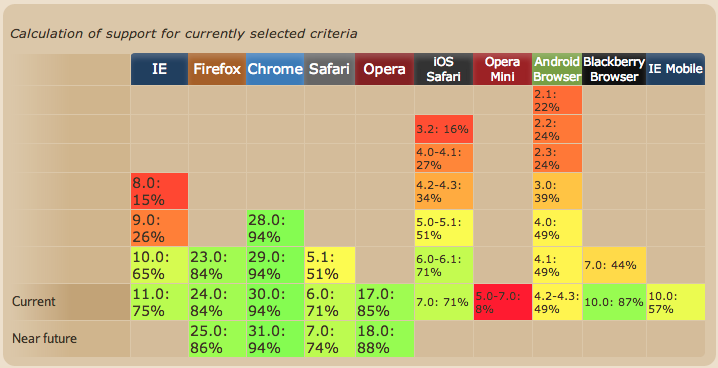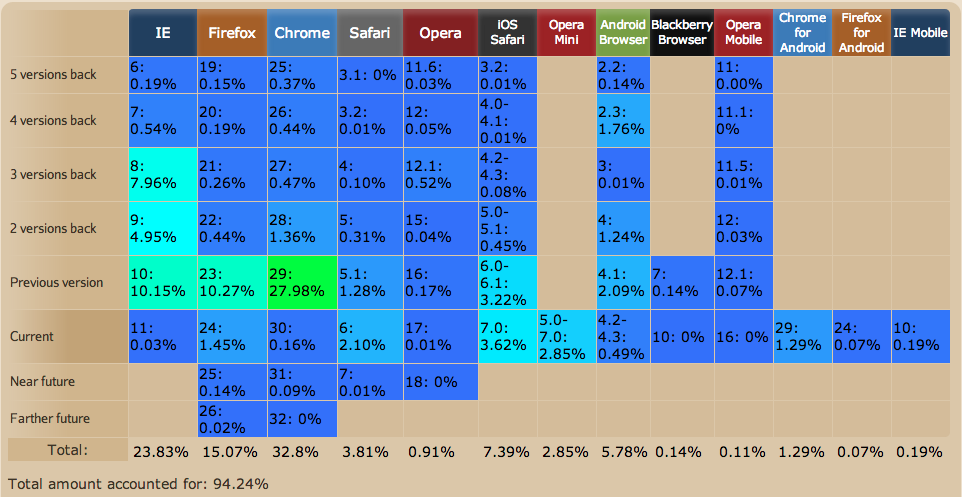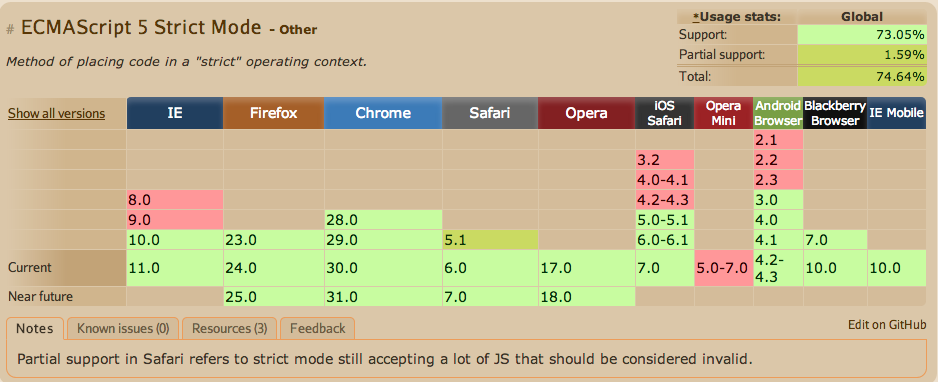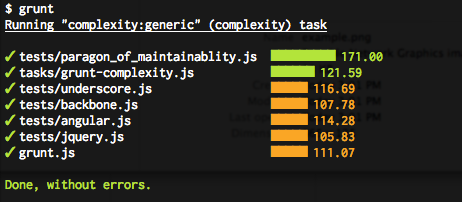Taking Javascript Seriously
You know, more like your 'real' development
Scott Nonnenberg
github.com/scottnonnenberg/taking-javascript-seriously
why take it seriously?
- More code
- More complex web experiences
- More hard-to-test interactivity
Raise your hand if you...
- unit test
- integration/acceptance test
- measure code coverage
- run static analysis
- run continuous integration
- use dependency injection
- use the service locator pattern
your server code?
Do that with your javascript?
Keep those hands up
Let's dig in
Basic tools
nobody writes straight javascript
jquery
use it? raise your hand
$('#id').click(function() {
alert('something!');
});
$.getJSON('http://somewhere', function(data) {
alert(data);
});
lodash/underscore
use it? raise your hand
var a = [1, 2, 3, 4, 5];
var result = _.reject(a, function(item) { return item > 3; });
console.log(result);
var b = [3, 4, 5, 6, 7];
var result = _.intersection(a, b);
console.log(result);
mvc/mvvm
use one? raise your hand
- backbone
- ember
- angular
- lots more!
use todomvc to shop around
why wouldn't you? organize your code intelligently!
open source: a different world
| XCode/VS/Eclipse | open source |
|---|---|
| big IDE | text editors |
| large built-in set of libaries | many options with separate communities |
| official channels | usually github |
| intellisense, docs, blogs | annotated source, blogs, sometimes docs |
choosing an open source project
activity level
- date of last release, frequency of releases
- look for open bugs - orphaned? time to resolve?
- date of the last commit
size of community
- stars and forks
- questions/answers on stack overflow
fork it, fix it, and pull request it!
other libraries I use
- timezone-js
- easyxdm - cross-domain communication
- spin.js - non-image progress spinners
- d3.js - svg-based interactive data visualizations
- socket.io - websockets, graceful degradation
which brings us to...
dependency management
how do you manage lots of libraries?
managing versions over time
semantic versioning (semver)
- X.0.0 for breaking changes
- 1.X.0 for addition of features
- 1.0.X for bugfixes
- warning: 0.x.x is flexible
jquery "1.x" or jquery "~1.10.2"
npm allows you to be hardcore: shrinkwrap
back to our project
but we're full TDD, right?
let's set up a test harness
mocha: test runner
mocha.setup('bdd');
describe('MyClass', function() {
before(function(done) {
// initial setup, async because arity > 0
done();
});
beforeEach(function() {
// before every test
});
describe('#method', function() { // nested describe
it('should handle a null parameter', function() {
// test logic here, exceptions denote failure
});
});
});
runs in the browser and on the command line
chai: fluid assertions
var expect = chai.expect;
var x;
expect(x).not.to.exist;
var data = { x: 6 };
expect(data).to.have.property('x', 6);
expect(data).to.deep.equal({x: 6});
sinon: stubs and spies
var spy = sinon.spy(String.prototype, 'toUpperCase');
expect(spy).to.have.property('callCount', 0);
expect('blah'.toUpperCase()).to.equal('BLAH');
expect(spy).to.have.property('callCount', 1);
spy.restore();
var stub = sinon.stub().returns(6);
expect(stub()).to.equal(6);
expect(stub).to.have.property('callCount', 1);
it can also redirect $.ajax and sandbox entire browser
blanket: code coverage
no instrumentation step!
easy client-side setup
<script src="blanket.js"></script>
<script src="my-library.js" data-cover></script>
easy node.js setup
mocha --require blanket --reporter html-cov testfile1.js testfile2.js
// in package.json:
"scripts": {
"blanket": {
"data-cover-only": "src"
}
}
phantomjs: headless browser
- run tests
- interact with web pages
- capture screenshots
- based on webkit
Rounding it out
documentation
groc
comments interspersed with source
jsdoc
meaningful tags
running in a real browser
muscula: error capture and reporting
use only for production; breaks mocha testing
but how?
want small, single-reponsibility files
don't want a new script tag per file
Modules
CommonJS
var _ = require('lodash');
module.exports = function(options) {};AMD
define(['lodash'], function(_) {
return function(options) {};
});
module managers
AMD: requirejs and almond.js
pro: no build step required; detailed control
con: boilerplate required for every file
CommonJS: browserify
pro: stubs out standard node.js components for you
con: requires build step to get into browser
Other: google closure compiler
pro: can prune unused code
con: requires build step to get into browser
dependency injection
function Obj(options) {
options = options || {};
this.Database = options.Database || Database;
this.database = new this.Database();
this.service = options.service || service;
}
Service Locator Pattern
Not a common thing in javascript world yet.
Angular - the first mainstream project to take it seriously.
other folks are experimenting with it
finally some code!
but how well do you know javascript?
falsey vs. truthy
console.log(!!null);
console.log(!!undefined);
console.log(!!false);
console.log(!!0);
console.log(!!'');
console.log(!!NaN);
var f = function() {};
console.log(!!f);
console.log(!!1);
console.log(!!'something');
console.log(!!true);
=== vs ==
var o = {a: 0};
console.log(o.a == '0');
console.log(o.a == 0);
console.log(o.a === '0');
console.log(o.a === 0);
o.a = null;
console.log(o.a == null);
delete o.a; // now it's undefined
console.log(o.a == null);
functions are objects
var f = function(a) {
console.log(arguments);
}
console.log(typeof f);
console.log(f);
console.log(f.length);
f.a = 4;
console.log(f.a);
f(6, 7);
f.call(null, 6, 7);
f.apply(null, [6, 7]);context and closures
var a = 1;
var f = function(b) {
return function(c) {
console.log('a: ' + a + '; b: ' + b + '; c: ' + c);
}
}
var g = f('2');
g(3);
g(4);
a = 2;
g(5);single-threaded, always
x = 0;
var first = setInterval(function() {
x += 1;
console.log(x);
}, 1);
var second = setInterval(function() {
x -= 1;
console.log(x);
}, 1);
setTimeout(function() {
clearInterval(first);
clearInterval(second);
}, 250); (web workers do now allow concurrency, but you don't have access to the same context)
prototype inheritance
function Super(options) { this.a = options.a };
Super.prototype.f = function() { console.log(this.a); };
function Sub(options) {
Super.call(this, options);
};
Sub.prototype = Object.create(Super.prototype, {
constructor: { value: Sub }
});
var p = new Super({a: 'super'});
p.f();
var c = new Sub({a: 'sub'});
c.f();
Sub.prototype.g = function() { console.log('post create add!'); };
c.g();getters/setters
function Obj() { this.value = 1; };
Object.defineProperty(Obj.prototype, 'property', {
get: function() {
return 'computed: ' + this.value;
},
set: function(value) {
this.value = value;
}
});
var o = new Obj();
console.log(o.property);
o.property = 2;
console.log(o.value);
Object.create and Object.defineProperty are ES5 features.
which brings us to...
uneven browser support!
nooo!
how bad is it?
caniuse
support matrix for javascript features, css, svg, html5
kangax
detailed es5 feature matrix
the horrible truth
overall javascript feature support
browser usage
all is not lost!
polyfills to the rescue!
polyfill: downloadable code providing functionality not built into a web browser
testing in actual browsers
test tools
services
back to the code
this
function Obj() { this.x = 7; };
Obj.prototype.f = function() { console.log(this); };
var o = new Obj();
o.f();
var g = o.f; // pull the method out
g(); // raw call, gets global context
g.call(o);
g = _.bind(g, o);
g();
var nope = Obj(); // forgot the new
console.log(nope); // undefined!
console.log(x); // where did this come from?
which brings us to...
strict mode
fixing some of the key problems with javascript
'use strict';
// these no longer parse
var broken = function(dupe, dupe) {}; // no duplicate parameters
var broken = { dupe: 1, dupe: 2 }; // no duplicate keys
with ({}) { x = 4; y = 3; } // no more with
var x = 015; // you probably don't mean octal syntax
// these fail at runtime
function Obj() { this.x = 7; };
var nope = Obj(); // this not set to global anymore
y = 5; // using undefined var
delete Object.prototype; // this would normally fail silently
strict mode support
you'll need to be a careful, since it changes behavior
okay, it's a bit tricky
but there are tools to help!
jshint
- forgot 'new' keyword?
- did you really mean == instead of ===?
- warn on use of undeclared variable
- never-used variables, unreachable code
- cyclomatic complexity, with error threshold
- force strict mode
- style: indentation and quote character
complexityReport.js
perhaps you'd like to check the maintainability of your code?
(best implemented using a grunt task)
which brings us to...
grunt: project automation
tasks available for jshint, mocha, watch, concat/minify, etc.
powerful api for developing your own tasks
whew!
we covered an extreme amount
fortunately, there are tools to help you jump in really fast
[sudo] npm install -g yo generator-webapp
mkdir yeoman-app
cd yeoman-app
yo webappstudy it for best practices, improve it, fork it, pull request it!





